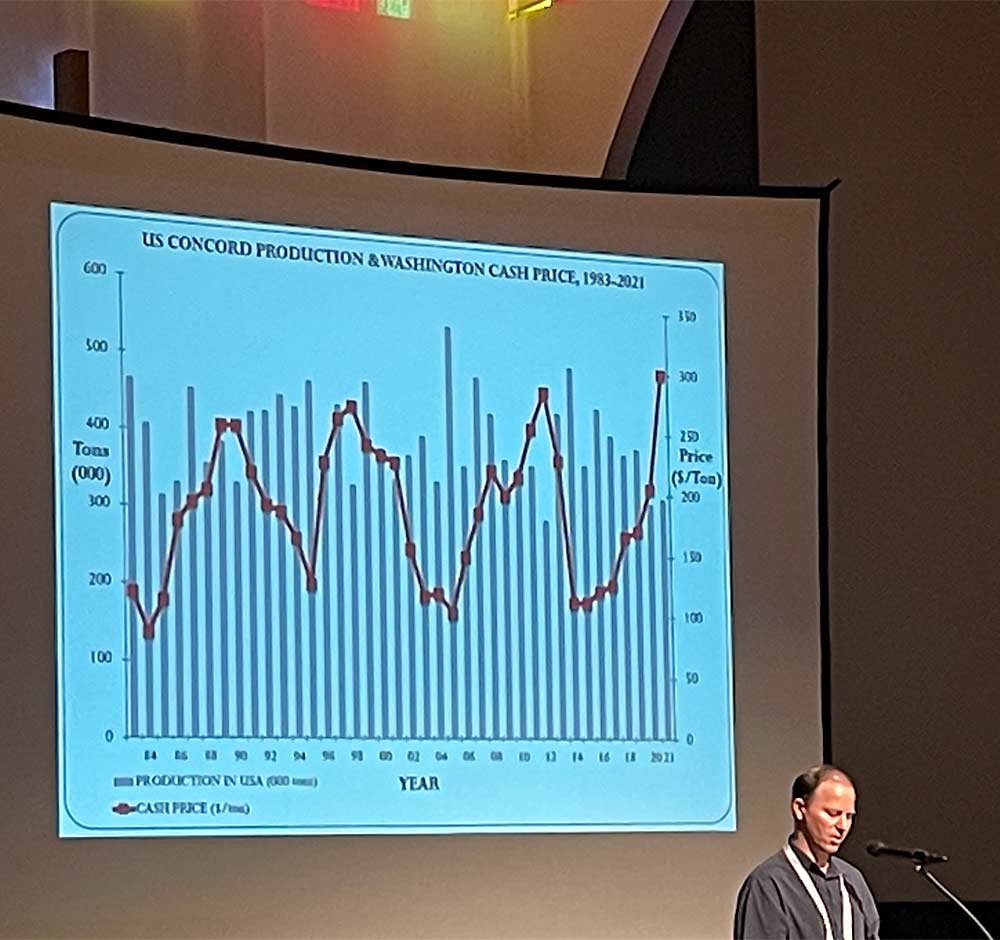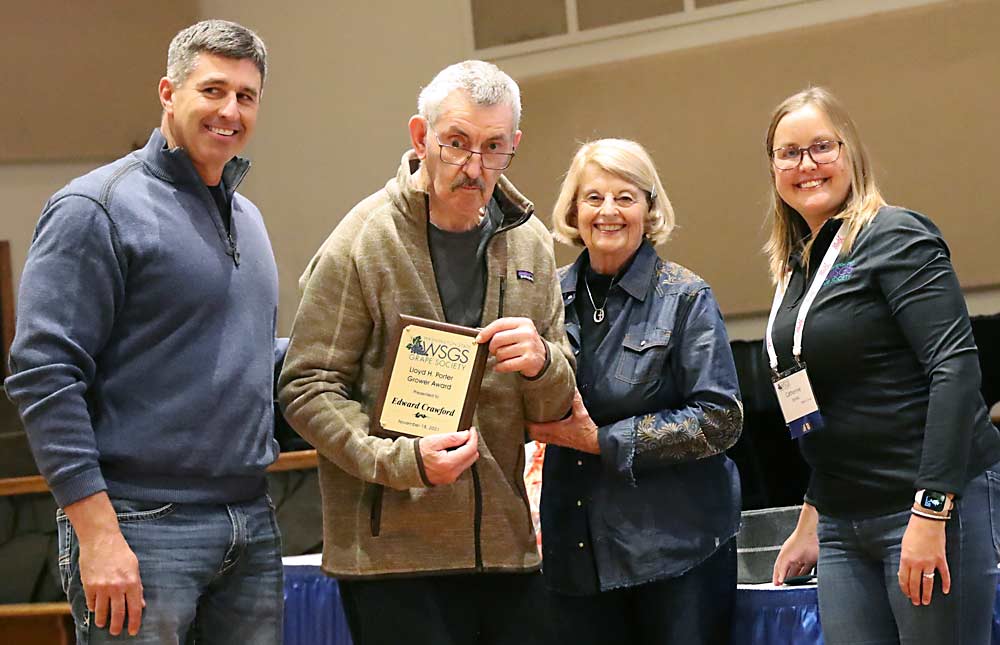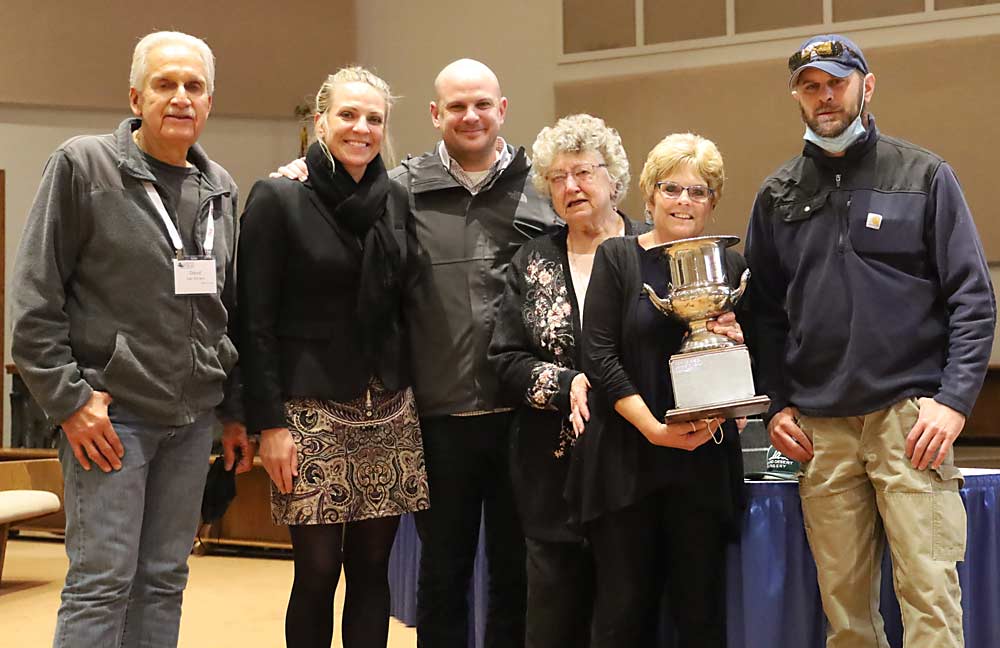
On Nov. 18, the Washington State Grape Society gathered in Grandview for its annual meeting, which included updates on the optimistic economic outlook for juice grapes and an opportunity to recognize industry leaders.
The industry’s official statistician, Trent Ball, shared how a combination of low production, low inventories and low imports resulted in a significant price jump for Washington producers. Cash price for Concords rose to $300 per ton, a 46 percent increase over 2020 and a price not seen since the mid ‘90s, said Ball, who directs the vineyard and winery technology program and Yakima Valley College.
“This is a very cyclical industry,” he said, showing the production and price charts over the past several decades. But, all things considered, “the cash price is likely to stay high (next year) unless something dramatic changes between now and then.”
Washington growers only harvested an estimated 103,000 tons in 2021, down from the 10-year-average of 178,000 tons. That’s because yield per acre was historically low, at 6.3 tons per acre compared to the average of 8.8. The acreage removals of recent years seem to be stabilizing, he added, with 16,300 acres in the state under Concord production.
Washington State University soil scientist Deidre Griffin LaHue gave a talk about the different soil health testing options available and how to select and interpret different test options. Her graduate student, Molly McIlquham, shared an update on her ongoing work to calibrate the soil health evaluation metrics developed in Eastern and Midwestern climates for semiarid Central Washington. Over the past two years, she collected soil samples at 70 vineyards and surveyed growers about management practices.
“Soils are healthy when they are serving their intended purpose,” McIlquham said. “If it’s supporting your crop and providing ecosystem services, it shouldn’t be receiving a failing score.”
Michigan State University entomologist Rufus Isaacs joined the in-person meeting via video conference to share insight into management of Japanese beetles and their impact on grapevines. The invasive insect, which is well established in the Eastern U.S., was recently detected in Grandview.
Then, Cassie Cichorz of the Washington State Department of Agriculture’s plant protection program shared an update on the state’s approach to quarantine for this pest and plans for eradication.
After lunch, the society honored two longtime leaders.
Society President Catherine Jones presented the Lloyd H. Porter Grower of the Year to Edward Crawford of Prosser.

“He and his family were, along with others, pioneers in turning many acres of sand and sage into valuable farmland, in what would become the Roza Irrigation District,” Jones said. “Ed has been a fixture on the Roza since the beginning. Those who know him know him to be a tireless worker and an exceptional neighbor.”
Crawford planted his first Concords in the 1960s and his first wine grapes, Riesling, in the mid ‘70s. Through the years, he always opened his farm to Washington State University research trials, Jones said.
She also presented the Walter Clore Award, posthumously, to Albert Don, who served as the vineyard operations manager at Wyckoff Farms for over 30 years. The award recognizes individuals for their service and contributions to the Washington state grape industy.

“He always wanted to make things easier, faster and find a better way to do things across the farm. He was always willing to share his ideas and learn from others at the same time,” Jones said. “His son, Jason, said that to him, Albert’s legacy is if you work hard, stay dedicated and be humble in your life, you can do anything that you put your mind to.”
Jason Don accepted the award on behalf of his father, who died unexpectedly in February. He said that if his dad were here to accept the honor himself, he would be at a loss of words, except to say that he shared the achievement with everyone on the Wyckoff vineyard team.
The grape society meeting will conclude Nov. 19 with talks on phylloxera-resistant rootstock trials, managing heat stress, overtime regulations and more.
—by Kate Prengaman






Leave A Comment